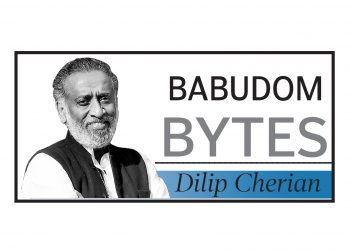A disparity in promotions has cast a shadow over the careers of IPS officers in Haryana, sparking concern among the ranks. The recent plea by two Inspector General of Police (IGP) rank officers, Amitabh Dhillon and Sanjay Kumar, from the 1997 batch, highlights the growing frustration within the state’s police service.
Sources have informed DKB that Dhillon and Kumar reportedly wrote to state DGP PK Agarwal, highlighting the issue of lagging promotions within the Haryana cadre when compared to counterparts in other states. Their call for “expeditious examination” of the matter underlines the urgency they attach to this concern. Surprisingly, despite recommendations for their promotion to the rank of Additional Director General of Police (ADGP), a meeting of the departmental promotion committee is still to be convened. They became eligible for ADGP promotions last year. The discrepancy intensifies even as 1998 batch IPS officers, a year junior to these two, have secured promotions in other states. Despite the rules requiring central government concurrence for promotions in selection grade and above, the provision is not implemented, leading to undesired delays in promotions. Dhillon and Kumar assert that their careers shouldn’t be adversely impacted by administrative delays beyond their control.
This imbroglio serves to remind us that while rules and regulations guide bureaucracy, their effective implementation and interpretation are equally important to shaping the careers of the officers.
Intriguing chess moves in UP babudom
In a significant development, Uttar Pradesh Chief Minister Yogi Adityanath recently transferred Ritu Maheshwari, CEO of Noida Authority, to Agra as a commissioner.
Maheshwari was known for her transformative initiatives during her four-year tenure in Noida. Her impact is undeniable. Her track record speaks volumes – securing investment proposals worth `1 lakh crore for Noida ahead of the UP Global Investors Summit 2023 and orchestrating a fiscal coup with record revenue receipts of `7,000 crore in the fiscal year 2022-2023, which is the highest revenue collection in 12 years. Moreover, Maheshwari revealed that `55,000 crore worth of investment proposals are pending and are expected to be realised in the next six months.
Her transfer has been met with mixed reactions from residents and businesses in Noida. And some have expressed concerns about her abrupt departure from the key position. While the Yogi sarkar stated that it is a routine transfer, sources have informed DKB that the move reportedly came two weeks after `3.9 crore was fraudulently transferred by an alleged conman using fake documents from the authority’s account.
Whether there’s a connection between this and Maheshwari’s transfer is hard to tell, though. Yet, it’s impossible to ignore the strategic undercurrents that might have propelled this seemingly routine move. Maheshwari is also known to be close to Union Home Minister Amit Shah. This connection, though unconfirmed, has set political and babu circles abuzz, and likely also disturbed a lot of equations between the Centre and the UP government.
Punjab Governor’s austerity drive hits babus
In a series of unconventional directives, Punjab Governor Banwarilal Purohit seems to be setting a unique tone for governance. Days after making headlines by temporarily banning tomatoes from Raj Bhawan’s kitchen in a show of solidarity with citizens facing food price inflation, Purohit has now taken a bold step by prohibiting Chandigarh Administration officers from air travel to Delhi and staying in five-star hotels for official work. The prohibition on air travel and the mandate to use Shatabdi and Vande Bharat trains instead hopefully sends a message of frugality in government spending.
Not surprisingly, the austerity drive has raised eyebrows in political and babu circles in the UT. Purohit’s unusual style is reminiscent of his tomato ban, which while symbolically aligned with the citizens’ concerns, did make some wonder about the practicality of such moves.
Also, the timing of Purohit’s decision, coupled with his history of conflict with political leaders, particularly Punjab Chief Minister Bhagwant Mann, adds another layer of complexity. Mann has repeatedly accused governors of leading extravagant lifestyles and his own record of using state aircraft has added political overtones to Purohit’s directives on frugal spending. Clearly, striking a balance between cost-saving measures and ensuring officials’ effectiveness is key.
Share a babu experience! Follow dilipthecherian@twitter.com. Let’s multiply the effect
